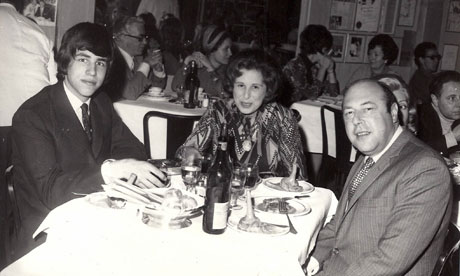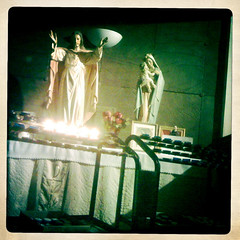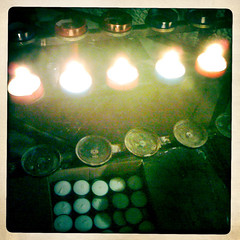
Once upon a life: Anthony Horowitz
"When the doorbell rings at three in the morning, it's never good news."
Those are the words that quite literally changed my life. I vividly remember writing them. I had published about 15 children's books, but with only a limited amount of success, and was seriously thinking of giving them up altogether. My television career, working on shows such as Robin of Sherwood and Poirot, was in much better shape. Who needed children's books anyway? (This was before Harry Potter.) But there had always been this one idea about a teenage spy that had been nudging at my consciousness, and one afternoon I sat down and wrote the first sentence of what was to be Stormbreaker, the opening novel in the Alex Rider series. Since then the books have sold about 12m copies in more than 30 languages, and the truth is that as I looked at that sentence, sitting in my studio in Crouch End, I knew that I had somehow unlocked something and that this would finally be the breakthrough I had been looking for.But actually the sentence is based on a far earlier memory, and it wasn't a doorbell that rang at three o'clock, it was a telephone. I was 21 years old and living in the north London suburb of Stanmore. I knew at once what the phone call meant. It was the hospital ringing to tell us my father had died.Once upon a life: Anthony Horowitz
He had been ill a few years before with a virulent and disabling form of cancer that had necessitated his first serious operation. My father, a fastidious and private man, never really came to terms with the medication, the medical apparatus and the dietary rules that now confronted him. And when the cancer returned, he never acknowledged it. The rule in our family was that you ignored illness, or at least downplayed it, and I often wonder if he might not have survived if he had only recognised what was wrong with him and gone back to the doctor sooner.
Anyway, he'd had a second, major operation that had brought a spark of hope which had quickly faded and we all – which is to say my mother, brother, sister and I – knew that the end wasn't far away.
The phone rang. I woke up and as I lay there I felt… nothing. I was aware I should be crying or burying my head in the pillow or emoting in some way, but I was completely numb. I gazed out of the window at the moonlight (just as Alex crosses to the window to see the police car below) and tried to think about the father I had lost.
Mark Horowitz was a man of many contradictions. He was a solicitor and businessman whose business always remained a mystery to me but which may have been on the outer fringes of the law. Why else would he have once asked me to cross London pretending to be a dispatch rider, delivering £150,000 (half a million in today's currency) to an anonymous man in an office in Mayfair? He was enormously cultured, with a love of classical music and a huge library of 19th-century novels which I later inherited. He was kind and generous with his wealth. At the same time he was remote and could be quite cruel. He never believed for a minute I'd make a success out of writing.
He had gone bankrupt some years before – this was when many investment banks collapsed. At the time we had been living in a quite palatial house in extensive grounds which should have been in the countryside but was actually just off the main Uxbridge Road. We had downgraded to a smaller, very ordinary house called Tall Chys. A chy was supposed to be the poetic name for a chimney, but I've never been able to find it in any dictionary. We'd once had five servants. Now we just had a delightful and infuriating housekeeper called Fitzy – she was the model for Sam Stewart in Foyle's War. My father was still doing deals. He was still a rich man. Or so we thought.
At any event, my mother came into my room, as always keeping her emotions under strict control, and we set off for St Thomas's Hospital. An element of farce entered the proceedings, as my brother, who was driving, decided to take a short cut around Belsize Park and somehow we managed to get lost. It didn't matter very much anyway, as my father had died long before we arrived. A nurse came down the corridor with that look that says it all. And still, like Meursault in L'Etranger (a book I had just finished reading) I couldn't connect with what was going on.
The nurse asked us if we would like to see the body. We all went in. I wish I hadn't. I have written dozens of murders for shows such as Midsomer Murders and Poirot. I have seen plenty of actors with their eyes closed, stretched out on the floors of libraries and sitting rooms. But real death is nothing like that. I will never forget the waxy, utterly lifeless thing that was lying on the bed. It wasn't my father at all. Every cell, every pore of his skin, even his hair was dead. And now, 35 years later, it is hard to get past that memory to the man who lived behind it. I don't want anyone to see me when I'm dead.
Stormbreaker starts with a funeral, and much of Alex's bewilderment and displacement was my own. In the Jewish religion you have to bury the dead as quickly as possible, and that same day I set off with an uncle to buy my father's coffin. Uncle David was a large, bullish man and my other vivid memory is watching him argue vociferously about the price of the coffin with an increasingly irate Eastern European undertaker. "You vont mahogany, you pay for mahogany!"
It was a bitterly cold day for a funeral – this was January, I think. Most of my family is buried in a large cemetery near Bushey, but I don't intend to end up there. It's too bleak. Although he had never been religious, my father had decided to have an orthodox funeral. No women were allowed to attend. I can still see my mother, sister and various aunts, all in black, standing arm in arm as we drove away. I had to read out the Kaddish – the Jewish prayer of death – over the grave, but I had long since abandoned my religion and so I had to have the Hebrew words written out in English phonetics and hidden behind the prayer book.
The first letter came a few days later. It was from a bank. "Dear Mrs Horowitz," it began. "Please may we offer you our most sincere condolences." It then went on to raise the awkward matter that the late Mr Horowitz owed the bank £100,000. The next letter came the day after. By the end of the week we had about a dozen and realised all my father's money had disappeared, that he had even cashed in the life-assurance policies, that effectively my mother owed everything she owned.
In the months that followed, she made a few trips to Switzerland in an attempt to find out what had happened to the money – but she was unsuccessful. I remember a black notebook with strange figures and code names: Archduke and Oscar. They were clues that led nowhere. It seemed my father had taken all his money out of one Swiss bank and deposited it in another – and not being aware how ill he was, had failed to mention where it was. It's quite likely that one of his business connections nipped over to Geneva and stole the lot even while we were in Bushey cemetery. I looked them up on the internet, these names I recall from my childhood. One of them was expelled from the stock exchange for premium stripping (he died in 1998). The other is described by the Economist as "a fugitive financier" and is still hiding, now in a wheelchair, in Spain.
anthony horowitz Photograph: Getty Images
I don't think my father was a bad man, all in all. I still have his books, and when I read them I think of him. But it's his death I remember mainly. His life is much further away.















